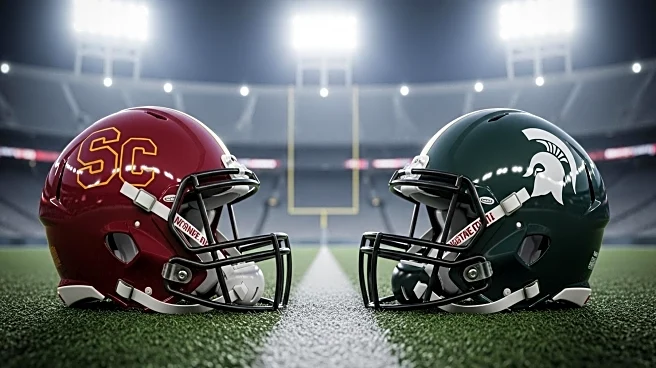What's Happening?
USC is set to face Michigan State in a late-night football game as part of their transition to the Big Ten Conference. The game is scheduled to kick off at 8 p.m. local time at the Los Angeles Coliseum, which means it will conclude around 2:30-3 a.m. in East Lansing, Michigan. This scheduling decision is influenced by broadcast rights, with Fox selecting this matchup as the best available game. Michigan State, currently undefeated with a 3-0 record, arrived in Los Angeles on Thursday to acclimate to the time zone change. USC, having previously dealt with similar late kickoffs, is prepared for the challenge, with Coach Lincoln Riley emphasizing the importance of handling the situation well and expecting strong support from the home crowd.
Why It's Important?
The late-night scheduling of the USC vs. Michigan State game highlights the impact of broadcast rights on college football, where financial considerations often outweigh geographic logic. This game is significant for USC as it continues to adapt to the Big Ten Conference, a move that promises increased visibility and revenue. For Michigan State, the matchup presents an opportunity to maintain their undefeated streak and gain national attention. The game also underscores the logistical challenges teams face with time zone differences, affecting both player performance and fan engagement. The outcome could influence perceptions of USC's transition to the Big Ten and its ability to compete in high-profile games.
What's Next?
Following the game against Michigan State, USC will face another time-zone challenge with an early morning kickoff against Illinois next week. This will test the team's adaptability and resilience in varying conditions. Both teams will analyze their performance and make necessary adjustments for upcoming games. The scheduling of future games may continue to reflect the influence of broadcast rights, potentially leading to more late-night matchups. Stakeholders, including coaches, players, and fans, will need to navigate these changes as the season progresses.
Beyond the Headlines
The scheduling of late-night games raises questions about the balance between commercial interests and the well-being of players and fans. The physical demands of playing at unusual hours could impact player health and performance, while fans may struggle to attend or engage with games that end in the early morning. This situation may prompt discussions about optimizing game schedules to better accommodate all parties involved, potentially influencing future decisions in college football.









